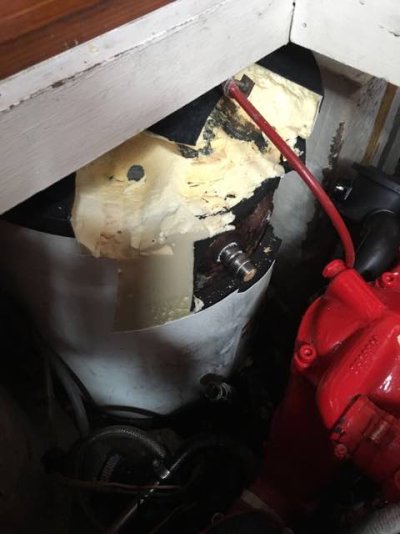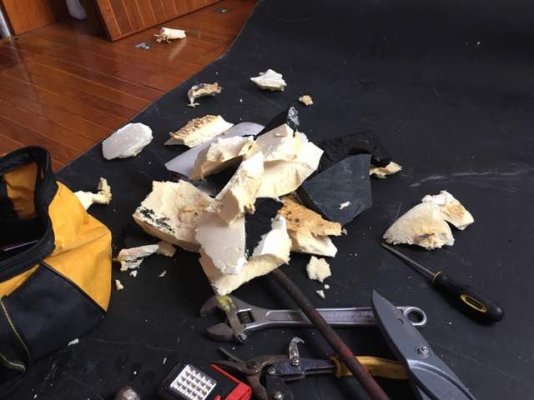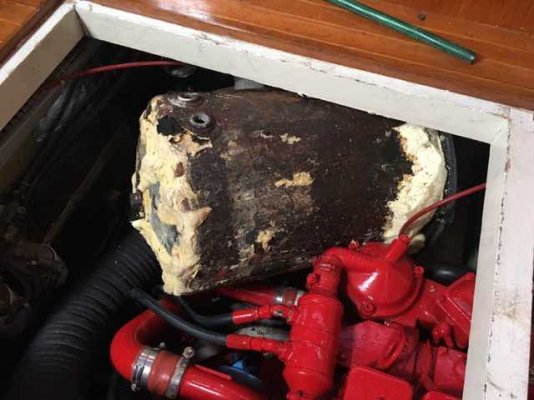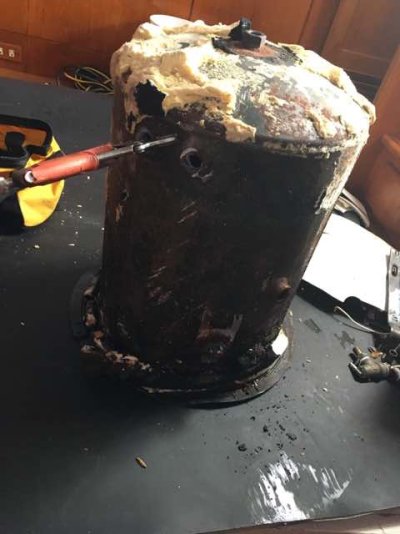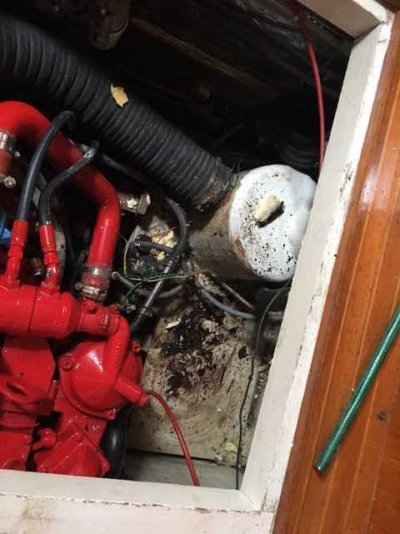You are using an out of date browser. It may not display this or other websites correctly.
You should upgrade or use an alternative browser.
You should upgrade or use an alternative browser.
hot water heater
- Thread starter fishpcb
- Start date
The friendliest place on the web for anyone who enjoys boating.
If you have answers, please help by responding to the unanswered posts.
If you have answers, please help by responding to the unanswered posts.
menzies
Guru
Anyone replace the hot water heater with a tankless system? Mine started leaking and it looks impossible to get it out without major work.
Home or boat?
A tankless system runs off gas if I am not mistaken. Do you have the gas set up that would allow that?
Frankly, I have never heard of a tankless system on a boat.
Lou_tribal
Guru
Home or boat?
A tankless system runs off gas if I am not mistaken. Do you have the gas set up that would allow that?
Frankly, I have never heard of a tankless system on a boat.
There are some electrical but very high wattage.
Tuttouomo
Senior Member
Water Heater
A tankless system for marine use would be a hydronic heating system with the option of heating water on demand with no tank.
I just installed on on my boat. ITR Hurricane System.
Bill
A tankless system for marine use would be a hydronic heating system with the option of heating water on demand with no tank.
I just installed on on my boat. ITR Hurricane System.
Bill
menzies
Guru
This is for the boat. West Marine sells a couple different ones.
Can you post a link. I would like to look at that.
Rebel112r
Guru
I have had 2, on 2 different boats. Not on the current boat. They were propane fueled, and they both worked well. One was a Paloma, with a pilot light and vented. The other was self igniting when it sensed water flow and ventless. Neither used any electricity. Concerns with them the same as with any propane fired device. Coast Guard and insurance companies don't think highly of them. These were smaller boats, so when using hot water, you were aware of the hazards, both had solonoids on propane supply and was only on when needing hot water. DS
psneeld
Guru
Attachments
"hot water heater"
Why would you need to heat hot water?
One of the advantages of conventional water heaters on boats is the ability to heat water with excess engine heat. If I'm cruising and anchor for the night, I have plenty of free hot water. It's still pretty hot the next morning. And at the dock on shore power, the electric heating element is pure simplicity.
Keep this in mind before changing things.
BTW: Make sure whatever you install is ABYC approved and the installation meets ABYC requirements. This is going to be very difficult with propane, a snap with a standard electric water heater.
Why would you need to heat hot water?
One of the advantages of conventional water heaters on boats is the ability to heat water with excess engine heat. If I'm cruising and anchor for the night, I have plenty of free hot water. It's still pretty hot the next morning. And at the dock on shore power, the electric heating element is pure simplicity.
Keep this in mind before changing things.
BTW: Make sure whatever you install is ABYC approved and the installation meets ABYC requirements. This is going to be very difficult with propane, a snap with a standard electric water heater.
Last edited:
Trundlebug
Veteran Member
WesK has made a very valid point.
It's not as if the additional weight of a hot water tank is an issue on a displacement boat, so I really can't see any advantage whatsoever in going to a tankless system.
Plus, from my experience with tankless systems it takes ages running the tap before the water finally starts to come through warm, then eventually hot. Limited water resource (i.e. total water tank volume) is a far bigger issue on a boat than the extra weight of a hot water tank - another reason why I would consider tankless impractical on a boat (I'm no fan of them in domestic systems either).
It's not as if the additional weight of a hot water tank is an issue on a displacement boat, so I really can't see any advantage whatsoever in going to a tankless system.
Plus, from my experience with tankless systems it takes ages running the tap before the water finally starts to come through warm, then eventually hot. Limited water resource (i.e. total water tank volume) is a far bigger issue on a boat than the extra weight of a hot water tank - another reason why I would consider tankless impractical on a boat (I'm no fan of them in domestic systems either).
dhays
Guru
- Joined
- May 26, 2015
- Messages
- 9,567
- Location
- Gig Harbor, WA
- Vessel Name
- Kinship
- Vessel Make
- 2010 North Pacific 43
I have a tankless water heater at home and love it. It is economical to operate and gives as much hot water as desired. The only delay getting hot water to the tap is the length of the pipes from the install location and the tap.
I agree with Wes though. After cruising for a couple hours we have plenty of hot water for showers and dishes through the next morning.
I think it may be worth the hassle of removing and replacing your existing hot water tank instead of re plumbing and installing a tankless.
I agree with Wes though. After cruising for a couple hours we have plenty of hot water for showers and dishes through the next morning.
I think it may be worth the hassle of removing and replacing your existing hot water tank instead of re plumbing and installing a tankless.
I will be putting in a regular marine hot water heater after reading the comments. The one I have is in a very tight spot and will have to take engine exhaust off just to get it out. I still think I will have it in and out in less than a half day so not that bad.
dhays
Guru
- Joined
- May 26, 2015
- Messages
- 9,567
- Location
- Gig Harbor, WA
- Vessel Name
- Kinship
- Vessel Make
- 2010 North Pacific 43
I will be putting in a regular marine hot water heater after reading the comments. The one I have is in a very tight spot and will have to take engine exhaust off just to get it out. I still think I will have it in and out in less than a half day so not that bad.
You work a whole lot faster than I do.
- Joined
- Oct 1, 2007
- Messages
- 7,332
- Location
- Texas
- Vessel Name
- Floatsome & Jetsome
- Vessel Make
- Meridian 411
ANd don't forget....it is usually a tank shrouded in stainless and insulation. You might be able to take the heater assembly apart to take it out. Obviously getting it back in might be an issue.
- Joined
- Oct 1, 2007
- Messages
- 7,332
- Location
- Texas
- Vessel Name
- Floatsome & Jetsome
- Vessel Make
- Meridian 411
Yep. Looks like will have to take the old round one apart to get it out. The new one will be square and will go back a little easier according to measurements.
Consider your hot water needs and maybe go smaller??? That is exactly what I did. My old one was just 6 gallons and I was ALMOST able to get it out without taking it apart. But take it apart I did. I went back in with a 5 gallon one and it slid right in.
Remember, these things got hot as hell and a little bit of hot water goes a long way. I have never run out of hot water on ANY boat that I have owned.
- Joined
- Oct 1, 2007
- Messages
- 7,332
- Location
- Texas
- Vessel Name
- Floatsome & Jetsome
- Vessel Make
- Meridian 411
Do you have the round or square water heater?
Mine was square....standard Seaward. But when you open it up, the tank is round with insulation all around it.
jndavidson
Member
- Joined
- Nov 21, 2007
- Messages
- 11
- Location
- Us
- Vessel Name
- Sierra Madre
- Vessel Make
- Custom aluminum, Kasten Marine
I have one on my boat. Installed when the boat was built in 2002 and has worked well ever since. Uses about 3 gallons of propane every 2 weeks with 2 people on board and also cooking with propane. Mine has a pilot light that remains lit, the newer ones are probably electronic.
FishPCB, if you do electric check for previous crimps on the wires. I had a fire recently when the old crimp connecter severed the hot wire and caused arcing inside the wire insulator. I cut back to the supply leads and crimped on #8 wires to the heater connecters with ring connecters. The pigtail wires on the new heater are only for demonstrating hookup not for crimping on to the supply leads.
- Joined
- Jun 25, 2008
- Messages
- 10,123
- Location
- Australia
- Vessel Name
- Now boatless - sold 6/2018
- Vessel Make
- Had a Clipper (CHB) 34
fishpcb, if access is a real issue, and removing engine exhausts is getting right up there, is it possible to install a nice large cylinder nearby, after making up a suitable platform, (leaving the old one disconnected and blanked off), and just route the engine and hot water in and outs using appropriate grade flexible hoses like I used in this pic when I replaced mine which had different dimensions from the old one...?
Attachments
More like a melt down with the acrid smell and some smudging of overhead. If you look to the left of the red cable you can see the severed crimp. By replacing the lead in wires with #8 wire you can put in nice strong crimp connectors.
Yep, looks like it got a little warm.
fishpcb, if access is a real issue, and removing engine exhausts is getting right up there, is it possible to install a nice large cylinder nearby, after making up a suitable platform, (leaving the old one disconnected and blanked off), and just route the engine and hot water in and outs using appropriate grade flexible hoses like I used in this pic when I replaced mine which had different dimensions from the old one...?
I got the old one out by taking it apart. The new one is square and will go back in with no problem.
I did look at the one like yours but the square worked better for my space.
Similar threads
- Replies
- 25
- Views
- 2K
- Replies
- 16
- Views
- 1K




